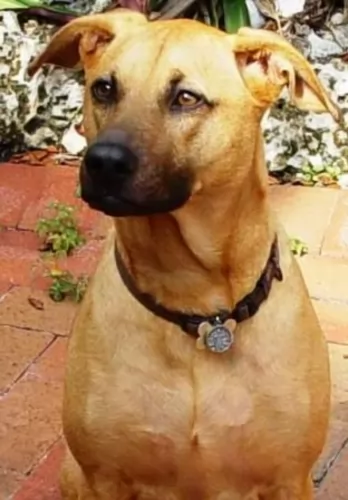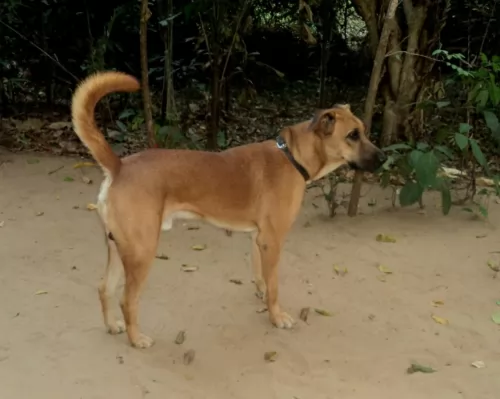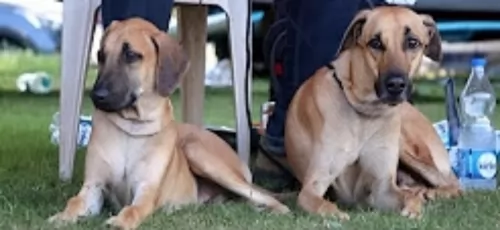 Petzlover
Petzlover Combai is originated from India but West Siberian Laika is originated from Russia. Both Combai and West Siberian Laika are having almost same height. Combai may weigh 11 kg / 25 pounds more than West Siberian Laika. Both Combai and West Siberian Laika has almost same life span. Both Combai and West Siberian Laika has almost same litter size. Both Combai and West Siberian Laika requires Low Maintenance.
Combai is originated from India but West Siberian Laika is originated from Russia. Both Combai and West Siberian Laika are having almost same height. Combai may weigh 11 kg / 25 pounds more than West Siberian Laika. Both Combai and West Siberian Laika has almost same life span. Both Combai and West Siberian Laika has almost same litter size. Both Combai and West Siberian Laika requires Low Maintenance.
 The Combai is a dog from Tamilnadu, Southern India, developed to hunt dangerous animals by the Indian royalty. It is a rare breed in India, believed to be close to extinction.
The Combai is a dog from Tamilnadu, Southern India, developed to hunt dangerous animals by the Indian royalty. It is a rare breed in India, believed to be close to extinction.
The dog is also known as the Indian Bear Hound, Indian Bear Dog and Tamil Bear Hound. You can spell the name of the dog with a ‘C’ or a ‘K’, Combai or Kombai.
Accurate records as to the history of this dog haven’t been kept, so much of the dog’s history is on speculation, although it is believed with some certainty, that the breed has been around since the 15th century. It is thought that the Combai was developed from Mastiff-type dogs, Pariah dogs, the Thai Ridgeback and Khoisan dogs.
 The West Siberian Laika come from the Khanty and Mansi tribes of West Siberia and Ural. They are a primitive breed used for hunting and come from the spitz and wolf lines. They retain many of their primitive looks and traits to this day. They were pre-historic companions to human hunters and remain so today in the northern regions of the Russia. They were never sled dogs but pure hunters throughout their journey to a domesticated breed. They hunted in the forests of the mountainous regions and were adapted to hunting in the woods. When their prey was hunted almost to extinction, the Laikas were also in danger of disappearing.
The West Siberian Laika come from the Khanty and Mansi tribes of West Siberia and Ural. They are a primitive breed used for hunting and come from the spitz and wolf lines. They retain many of their primitive looks and traits to this day. They were pre-historic companions to human hunters and remain so today in the northern regions of the Russia. They were never sled dogs but pure hunters throughout their journey to a domesticated breed. They hunted in the forests of the mountainous regions and were adapted to hunting in the woods. When their prey was hunted almost to extinction, the Laikas were also in danger of disappearing.
From the early days of the 1900’s through the first World War, there were several campaigns to save the WSL from extinction. A breed standard was developed around the 1930’s. Following the war the breeding programs became more uniformed and followed the standard that was in place. World War II disrupted it again, but once again it was resumed after the war.
The breed was once again threatened by industrialization and deforestation in the early 20th century, as they were replaced by newer, more popular breeds. There were thought to be dozens of aboriginal Laikas with various groups attached to different groups of indigenous hunters.
Following the second World War and the ever increasing detail of breed standards, the Laikas were divided into four pure bred groupings: the West Siberian Laika, the East Siberian Laika, the Russ-European Laika and the Karelo-Finnish Laika. All of these breeds are Laikas because they are bark pointing hunters.
They were imported to the U.S. in the early 1990’s by a Russian immigrant. Vladmir Beregovoy is credited with bringing the breed to the States. There are now about 300-400 West Siberian Laika’sin the U.S. They are a very emotional breed, very in touch with his human’s feelings, habits and intentions. He is a barker for sure who hates to be left alone. An intense breed with the need for companionship and a purpose. They will do anything to escape a pen if left alone for long periods of time.
The breed is protective of its people with other animals and some are wary of strangers. He needs an active family to match his active spirit. They will bark at all wild life including all the squirrels in your yard. So if don’t want a “barker”, don’t get a West Siberian Laika.
They are recognized by the United Kennel Club, the American Canine Association the Dog Registry of American and the Federation Cynologique Internationale
 The Combai is a medium sized dog, standing at between 43 to 64cm in height and weighing up to 34kg. Possibly the most distinctive feature of the Combai is a ridge of fur that runs down its back, with the hair growing in the opposite direction to the dog’s body hair. The coat of the dog is short and smooth with colors being brown, tan or reddish. The dog is medium sized, though size does vary quite a bit . The dog is muscular, lean and athletic with a long tail that curls over the back.
The Combai is a medium sized dog, standing at between 43 to 64cm in height and weighing up to 34kg. Possibly the most distinctive feature of the Combai is a ridge of fur that runs down its back, with the hair growing in the opposite direction to the dog’s body hair. The coat of the dog is short and smooth with colors being brown, tan or reddish. The dog is medium sized, though size does vary quite a bit . The dog is muscular, lean and athletic with a long tail that curls over the back.
The head of the Combai is fairly narrow with a muzzle which is quite long.The ears of the Combai vary as well and usually drop down or they fold backwards.
The Combai’s temperament is by no means gentle and it is believed to be a fierce, angry breed who will fight other dogs to the death.
It is sometimes hard to believe that the Combai, with training and socialization can make a good family pet. He then loves the company of his human family and remains loyal to them. When trained and socialized they also get on well with children in the home.
It isn’t recommended as a first dog choice for those who have never owned a dog as it does tend to be aggressive. The dog is also very territorial and alert and its why he makes a good watchdog.
 The WSL comes from the Spitz line and also directly descendent from the wolf. They look and act a lot like a wolf in many ways. They have retained much of their primitive traits. With a pointed, long muzzle, an almost square head, and square body, they have wolf colored coats of gray and red. They are mostly medium in size but some can be smaller or larger. Their head is shaped like a wedge, their eyes are typical almond shape and set deep in their head. They are brown or even darker. The muzzle is almost as long as the skull. Their lips are thin and black. The ears are straight up and pricked.
The WSL comes from the Spitz line and also directly descendent from the wolf. They look and act a lot like a wolf in many ways. They have retained much of their primitive traits. With a pointed, long muzzle, an almost square head, and square body, they have wolf colored coats of gray and red. They are mostly medium in size but some can be smaller or larger. Their head is shaped like a wedge, their eyes are typical almond shape and set deep in their head. They are brown or even darker. The muzzle is almost as long as the skull. Their lips are thin and black. The ears are straight up and pricked.
They have bodies longer than they are tall with a lot of musculature. They carry their tail high over their backs. With straight legs and forward feet, with gray, red and white coats, they still look like wild dogs.
 The Combai is known for its bravery and fearlessness and this is what makes him such an exceptional watch dog as he also doesn’t take kindly to strangers.
The Combai is known for its bravery and fearlessness and this is what makes him such an exceptional watch dog as he also doesn’t take kindly to strangers.
The Combai is full of energy too and won’t like to spend days lying around. He will require regular exercise.
Have him trained and socialized and he becomes the most loyal and devoted pet and companion.
 3.Adaptability This is not really an apartment dog though he can adapt. He needs outdoor space to run everyday. So if in an apartment find a dog park for everyday use.
3.Adaptability This is not really an apartment dog though he can adapt. He needs outdoor space to run everyday. So if in an apartment find a dog park for everyday use.
4.Learning ability – Highly trainable and very smart. Independent thinker though might cause some issues.
 Most dog experts will agree that the Combai is a breed that enjoys excellent health, and that in fact it seems as though the dog is disease- and parasite resistant.
Most dog experts will agree that the Combai is a breed that enjoys excellent health, and that in fact it seems as though the dog is disease- and parasite resistant.
There are however, always common dog illnesses that every dog owner should be aware of and it is always to a dog owner’s benefit to have their pet tested by Foundations such as the Orthopedic- and Canine Eye Registration Foundation who can perform tests to identify potential health defects before they show up.
Some of the ailments of concern in hounds include progressive retinal atrophy, demoid sinus and hip dysplasia.
The Retina is the light sensitive part of the eye and also part of the central nervous system. In retinal degeneration, the cells of the retina decline in function and this is what leads to possible blindness.
Progressive retinal atrophy worsens with time. If your pet doesn’t seem to react to light properly it may be wise to have him checked by the vet.
This defect is found in newborns as well as later on in life, and found primarily in Ridgeback dogs. Dermoid sinus is a neural tube defect that is typically found along your dog’s back, the tail and the neck.
The role of the tubes is to drain out dead cells for example. Not correctly formed, they become infected and an abscess forms with discharge. You will have to get your pet to the vet who will proceed with treatment as your pet can experience pain and discomfort.
 Health wise there are no genetic health issues known today. Since they were so wild, primitive and isolated there was not a lot of inbreeding to any standards. There are however some interesting health facts about the WSL.
Health wise there are no genetic health issues known today. Since they were so wild, primitive and isolated there was not a lot of inbreeding to any standards. There are however some interesting health facts about the WSL.
• Females only come into estrus once a year, usually in the late winter. They are usually one to two or two and a half years old when this happens. The Russians who know them best frown on breeding them before they are at least two.
• They are subject to many of the same parasites and some diseases like any other canine. But they are not susceptable to any illness specific to their breed.
• Hunting accidents might bet he biggest health threat this breed faces at the moment.
• However with more dogs being bred for the show ring, this could all change and genetic issues could begin to pop up for them.
 The Combai is an active dog and he will require quite a bit of exercise. A good way of giving him exercise is to take him on walks or allow him to go jogging with you or cycling.
The Combai is an active dog and he will require quite a bit of exercise. A good way of giving him exercise is to take him on walks or allow him to go jogging with you or cycling.
Denying him exercise will make him frustrated and destructive. His high exercise needs mean that he won’t do well in small apartments but will do well in the suburbs or in the country.
With his short coat, the Combai is a low maintenance breed. This breed should never require professional grooming, only an occasional brushing. Other than that, he will require his nails being clipped, his ears checked for infection and his teeth cleaned 2 or 3 times a week.
High energy dogs like the Combai will require a top quality kibble diet recommended by your vet with raw meat included in his diet from time to time as well as nutritious cooked food added in such as brown rice, vegetables and cooked chicken. Fresh water must be available to him night and day non-stop.
 performance, working dog food. High in protein and fat is needed to maintain their lean muscle. Don’t over feed them as they will become obese and they will be unhappy if their physical activities are restricted, even if by their own weight. Be sure you break up their day’s food amount into 3-4 smaller meals.
performance, working dog food. High in protein and fat is needed to maintain their lean muscle. Don’t over feed them as they will become obese and they will be unhappy if their physical activities are restricted, even if by their own weight. Be sure you break up their day’s food amount into 3-4 smaller meals.
2.Feeding the adult – Almost everything is equally true for the adult. They need a high protein and high fat food – a high performance food. Don’t over feed and give them at least 2 meals per day.
3.Points for Good Health – as previously mentioned this is a hardy and robust breed,
4. Games and Exercises They need a lot of exercise, have a strong prey drive and are very intelligent. A dog with those traits that does not get enough exercise will drive you crazy if he is not stimulated.